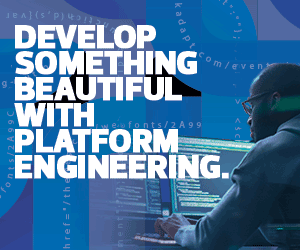What Tools Are Important for a Transition to Platform Engineering?
To be successful at platform engineering, “you need a foundation, for sure,” says Atif Chaughtai, global healthcare industry lead at Red Hat. “There is a plethora of processes that most organizations should have.”
Examples include continuous integration and continuous delivery, application programming interface management, containerization strategies, and Infrastructure as Code.
IaC is an especially critical component because it gives engineers the time and energy to focus their skills on value-added tasks while automating simpler responsibilities.
“In a healthcare environment, where uptime and availability are so crucial, the less manual intervention your engineers have to do, the better,” Shaffar says, adding that automation helps reduce mistakes.
DISCOVER: Here’s what health systems should know about platform engineering.
“Platform engineering is about providing a good experience to the developers and accelerating their capability to produce and deploy code. That’s where Infrastructure as Code comes in,” Chaughtai explains. “Anything you can automate that is trivial” is beneficial.
For example, say a printer becomes disconnected from an electronic health record system upon getting a new IP address. Rather than waiting for an IT team member to manually add the printer to the server, Chaughtai says, engineers can write a script that automatically identifies available new network printers and maps them to the print server.
But beyond the technologies and software practices, Shaffar says, it’s equally important to have buy-in from the engineering team.
“You have to develop a culture that emphasizes releasing software early and often and getting continuous feedback,” he explains. “If you’re not doing that, you’re wasting its potential, and then you have a platform that nobody uses.”
Avoid Mistakes When Deploying Platform Engineering in Healthcare
Shaffar and Chaughtai recommend that IT decision-makers to do the following things when preparing to implement platform engineering.
Identify the Why and Where
Tech leaders should clarify why the organization needs an internal platform and the areas where it could be most useful.
“Take a hard look at the current state of your technology and your infrastructure and identify the pain points,” Shaffar says. “That’s going to give you the first place to focus on.”
“How is your platform engineering effort tied to the business outcomes that you’re looking to drive?” Chaughtai asks. “If you’re not delivering business outcomes, the internal platform’s value might be questioned.”
Do a Pilot Run
Platform engineering can lead to increased productivity and optimized workflows across the entire organization, but Chaughtai recommends that healthcare IT teams “start small and nimble” with targeted pilot programs.
“Take a business priority and break it down into smaller goals,” he says. “Then, tie your IT strategies to it and start delivering on those goals iteratively.”
RELATED: Five ways your organization can benefit from platform engineering.
Focus on Systems That Generate Value
Shaffar says that one mistake he’s seen healthcare organizations make is failing to connect their platform engineering strategies to a value-generating area, such as customer-facing applications. “What can happen is that you build a beautiful platform, but you haven’t actually tested it with anything that creates value, so you don’t know if you built the right thing,” he says.
Chaughtai notes that Red Hat worked with a hospital system that successfully launched an internal platform focused on reducing readmissions. Engineers built tools into the platform to help clinicians, care coordination teams and pharmacies better monitor patients to ensure they received the appropriate follow-up care. “The platform engineering team wanted to go outside our four walls and extend the platform’s capabilities,” he says.
Emphasize Training with DevSecOps Workshops
Don’t overlook the need for training. Chaughtai says that DevSecOps workshops are always a good idea.
“The platform is supposed to provide a consistent experience to the developers, but also to the operations and to the security team. Bring them all together to explain what you’re trying to achieve and what information they’ll need to share with each other,” he says. “Having those pieces articulated up front is a very necessary step in establishing a platform within the company.”
“Having those connections, that training and that cross-functional thought helps teams be more proactive than reactive,” Shaffar says.
He adds that the long-term benefits platform engineering can provide make it worth the effort and investment. “Imagine crafting a new solution, and you can take 50 percent, 60 percent or 70 percent of the infrastructure off the shelf and just focus on building whatever it is that makes it unique,” he says. “With platform engineering, we can do away with the monotonous pieces and really target game-changing innovations.”











